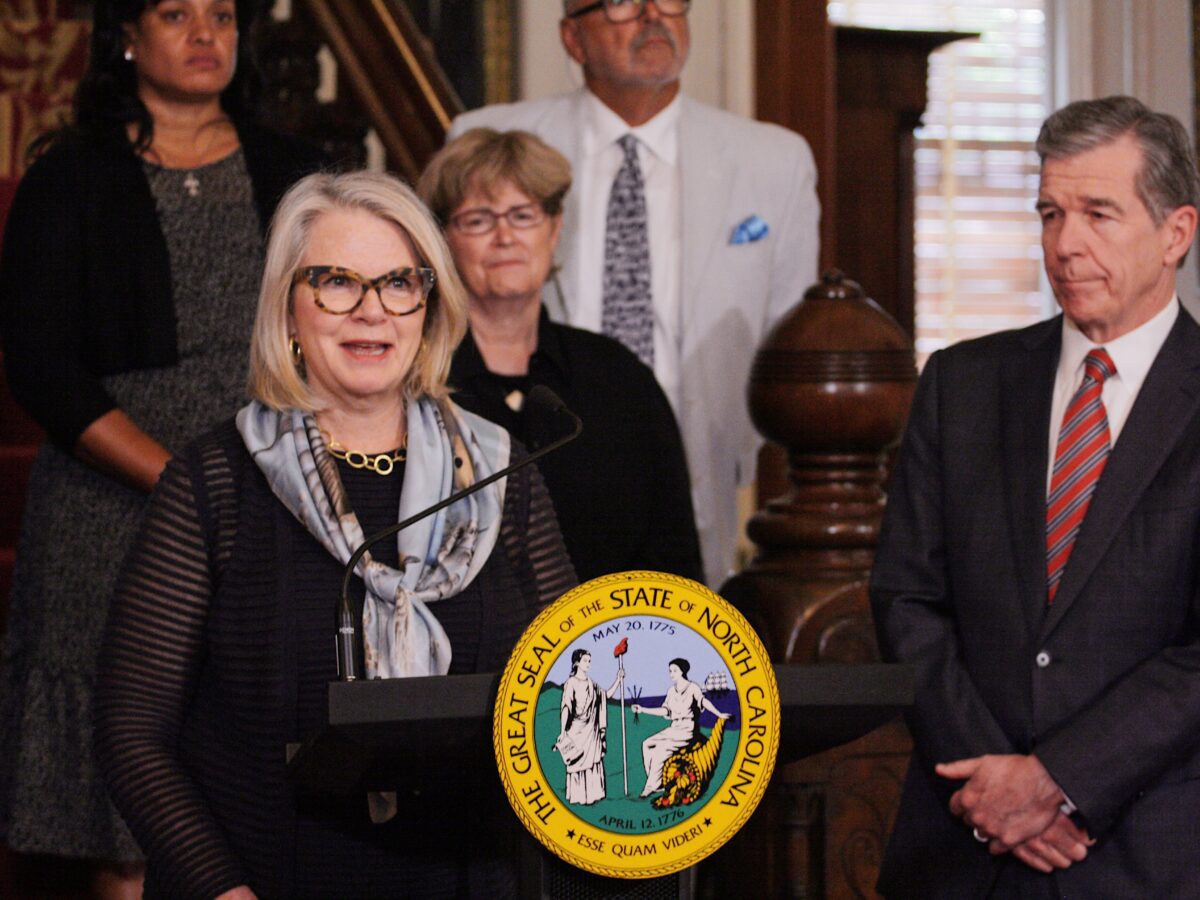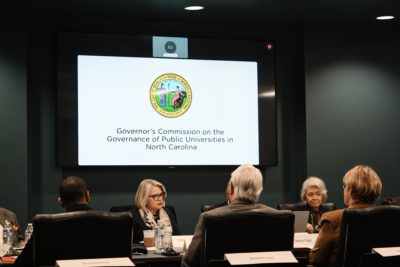
Share this story
- Gov. Roy Cooper announced the commission on Nov. 1, citing signs of undue political influence and bureaucratic meddling among university governance. The 15-member bipartisan commission spent the last eight months studying solutions.
- “Our recommendations are focused in significant part on ensuring the voices of all North Carolinians are reflected and represented on the governing boards of our universities. It's the law and it's what is best for good governance," said co-chair Tom Ross.
|
|
The Governor’s Commission on Public University Governance announced its recommendations for strengthening the UNC System today, including the creation of a Center of Higher Education Governance to assist boards in enhancing existing governance practices and training new board members, among other things.
“North Carolina’s visionary leadership in higher education has distinguished our state and made a real difference for our people,” Gov. Roy Cooper said in a release. “These recommendations will help strengthen this system and keep it as the priceless gem and economic recruitment tool it is for our state.”
Cooper announced the commission on Nov. 1, citing signs of undue political influence and bureaucratic meddling among university governance in the state. The 15-member bipartisan commission, co-chaired by former UNC System leaders Tom Ross and Margaret Spellings, spent the last eight months studying board governance and appointment methods.
From February to April, the commission also hosted six public listening sessions across the state to gather stakeholder input on improving public university governance.
The commission made a number of other recommendations on Monday concerning individual boards of trustees along with the UNC Board of Governors, which oversees the entire UNC System.
“We believe a key to good governance is having a Board of Governors (BOG) and institutional boards of trustees that reflect the people of our great state,” Ross said at a press conference on Monday. “Our recommendations are focused in significant part on ensuring that the voices of all North Carolinians are reflected and represented on the governing boards of our universities. It is the law and it is what is best for good governance.”
The commission aims to finalize and publish a report of its recommendations at the end of this month. Here is a list of the seven recommendations approved and presented by the commission on Monday:
- The UNC Board of Governors should create a new Center of Higher Education Governance to optimize the use of good governance principles in higher education throughout America and to assist the Board of Governors and Boards of Trustees (BOTs) in enhancing existing governance practices in North Carolina. Among other things, that center would “provide thought leadership on higher education governance in North Carolina and throughout the United States,” develop and deliver an orientation for all new board members across the state, and maintain a database of trained and interested potential board members.
- The General Assembly should increase the size of the Board of Governors from the current 24 to from 32-36 members. Sixteen of those members should be selected at-large and another 16 selected equally from each of the eight prosperity zones, per the recommendation. The BOG should include the state superintendent and N.C. Community College System president as non-voting, ex-officio members. The BOG should also include as two non-voting ex-officio members the chair of the faculty and staff assemblies, in addition to the current student representative – who brings the total number of members to 37. The commission recommends the student representative vote on all matters other than the election of the officers of the BOG.
- The General Assembly should select all members of the Board of Governors who are not ex-officio members in the following manner. The majority party will select 24 members, with half from each chamber. The largest minority party will select eight members, with four from each chamber.
- The General Assembly should increase the size of each of the institutional Boards of Trustees (other than the North Carolina School of Science and Math) to 15 members, not including ex-officio members. The commission recommends seven members of each local board are selected by the BOG, four by the General Assembly, and four by the governor. In addition to the existing student member of each BOT, the commission recommends two non-voting ex-officio members be added – the campus chair of the Faculty Senate and the campus chair of the Staff Assembly. Any appointments allocated to the governor should take place after Jan. 1, 2025, when Cooper’s term expires.
- The General Assembly should increase the length of the terms of members of the Board of Governors and Boards of Trustees from 4 years to 8 years. Members would be limited to one full term on the board to which the individual is appointed. The commission said this recommendations helps build expertise and experience on boards, while also allowing new members to join boards more frequently. Currently, members can serve three terms of four years, or a total of 12 years.
- To enhance transparency and accountability of board members, all general business meetings of the Board of Governors and each Board of Trustees should be livestreamed and recorded. Committee and full board meetings should be publicly notified and held in public locations that can accommodate a reasonable number of members of the public. The commission also recommends all BOG and BOTs members should be required to create and use institutional email accounts for all relevant governance correspondence.
- Any individual who has been serving as a registered lobbyist or as a member of the General Assembly should have a required “cooling-off” period before serving on a governing board. The commission recommends a one-year cooling-off period.
You can read the full recommendations here.
You can also read recommendations from Ran Coble here, which were included with Monday’s agenda items. Coble previously served as executive director of the N.C. Center for Public Policy Research, which in 2006 published a report strengthening UNC System governance.
The governor’s commission previously discussed that report, along with several of its recommendations. Coble’s recommendations praised several of the commission’s ideas, including the creation of the Center for Higher Education Governance, adding the superintendent and North Carolina Community College System president as a non-voting member of the BOG, and making the BOG student representative a voting member.
However, Coble recommended a cooling-off period of three years for lobbyists and former legislators, instead of one. He also recommended returning BOG appointing powers to the governor, and further increasing diversity on all higher education boards. Statute G.S. 116-7(a) requires the legislature to elect members of the Board of Governors who reflect the “economic, geographic, political, racial, gender, and ethnic diversity of the State.”
Coble recommended publishing demographic data to show the current lack of board diversity, and “then consider recommending that the Governor sue in his individual capacity or that he consider asking the Attorney General to sue for enforcement of the statute.”
He recommended against increasing the BOG size and changing board term limits, along with including the chairs of the Faculty Assembly and the Staff Assembly as non-voting board members.

History of N.C. public university governance
The UNC System is made up of 16 public universities that serve nearly 250,000 students each year. Members of the UNC System Board of Governors, which oversees the entire system, are appointed by the state legislature. The Board of Governors then controls appointments to the individual universities’ boards of trustees as well as chancellors and presidents.
The demographics of UNC system trustees do not “perfectly mirror” the demographics of the state’s population or public university student enrollment, according to a report by Davidson College presented to the commission in December.
The majority of system trustees are male and white, the report found, with a plurality of Republicans. There is only one registered Democrat on the Board of Governors, and there are zero Hispanic or Asian members on the Board of Governors.
While the commission said ensuring diversity on the boards was central to its work, the recommendations do not include any race or gender board quotas.
On Monday, Ross brought up the legality of requiring diversity in appointments.
The appointment process used to require at least minimal representation on the Board of Governors — four seats each — for women, racial minorities, and members of the minority political party. In 2001, the General Assembly appealed that language following a lawsuit. The amended statue reads:
“In electing members, the objective shall be to obtain the services of the citizens of the State who are qualified by training and experience to administer the affairs of The University of North Carolina. Members shall be selected based upon their ability to further the educational mission of The University through their knowledge and understanding of the educational needs and desires of all the State’s citizens, and their economic, geographic, political, racial, gender, and ethnic diversity.”
However, Ross said the commission believes several of its recommendations will indirectly address diversity, namely by expanding the number of people who serve on boards and limiting members to one eight-year term.
The hope is also that the Center of Higher Education Governance could offer training to people interested in serving and keep a database for appointing powers to confer, Ross said, which would ideally include demographic information.
“We had a long discussion about what else could we do, and there are limitations on the wall that I think allowed us to go the direction we’ve gone,” Ross said, “which I believe over time will make a difference. I really do.”
One commission member, Rep. John Bell, R-Wayne, disengaged from the commission after its early discussions about the importance of diversity, the Assembly reported.
Cooper added on Monday that the recommendations include diversifying who makes board appointments, ensuring more diversity of political thought.
Under the commission’s recommendations, the current and future legislative leadership would not lose any appointments until January 2025 – when any gubernatorial appointments to the Boards of Trustees would also go into effect. All other recommendations would go into effect upon approval by the General Assembly and Board of Governors.
“It is important that Gov. Cooper has embraced these recommendations, not because they benefit him,” Spellings said on Monday. “But because they can stand the test of time, however the political winds blow.”
Republicans have maintained control of the state legislature, which appoints the Board of Governors, for the last decade.
Already this long session, Republicans – who now have a supermajority – have introduced legislation to remove or change gubernatorial appointments on other boards, including the state board of transportation, boards of election, and the State Board of Community Colleges.
The General Assembly is also already considering a bill to enlarge the Board of Governors, Senate Bill 512, from 24 to 28 members.
On Monday, Cooper said he hopes the General Assembly’s focus on diversifying appointment powers will carry over into UNC System governance, too.
Ross said the bipartisan board – made up of eight Democrats, six Republicans, and one unaffiliated member – “worked in a collaborative and civil manner to reach near consensus” concerning its recommendations.
“We all believe that the UNC System has been a mighty engine for North Carolina’s success,” Spellings said. “We have seen the governance of these critical public institutions as an important issue across our country, and a place where North Carolina can play a leadership role. … We must have systems that the public understands, supports, and where they are welcome to participate – places where they see themselves, and these recommendations will help do just that.”
At the announcement of the commission, Cooper said his goal was to prepare a proposal for consideration by the end of this year’s long session, which is typically during the summer.
On Monday, Spellings said she and Ross would aim to finalize a report draft for members to review by June 20. Then, the commission will meet virtually the week of June 26 to vote on and approve the report.




